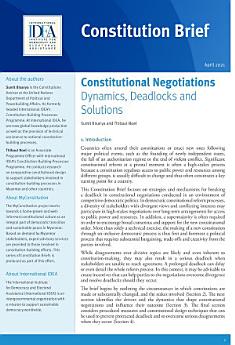Constitutional Negotiations: Dynamics, Deadlocks and Solutions
O ovoj e-knjizi
Significant constitutional reform at a crucial moment is often a high-stakes process because a constitution regulates access to public power and resources among different groups.
While disagreements over divisive topics are likely and even inherent to constitution-making, they may also result in a serious deadlock when stakeholders are unable to reach agreement. A prolonged deadlock can delay or even derail the whole reform process. In this context, it may be advisable to create incentives that can help parties to the negotiations overcome divergence and resolve deadlocks should they occur. This Constitution Brief focuses on strategies and mechanisms for breaking a deadlock in constitutional negotiations conducted in an environment of competitive democratic politics.
O autoru
Sumit Bisarya is the Constitutions Advisor at the United Nations Department of Political and Peacebuilding Affairs. He formerly headed International IDEA’s Constitution-Building Processes Programme. At International IDEA, he oversaw global knowledge production as well as the provision of technical assistance to national constitutionbuilding processes.
Thibaut Noel is an Associate Programme Officer with International IDEA’s Constitution-Building Processes Programme. He conducts research on comparative constitutional design to support stakeholders involved in constitution-building processes in Myanmar and other countries.
The International Institute for Democracy and Electoral Assistance (International IDEA) is an intergovernmental organization with a mission to support sustainable democracy worldwide





